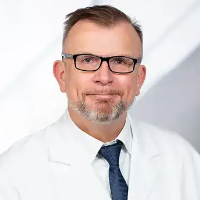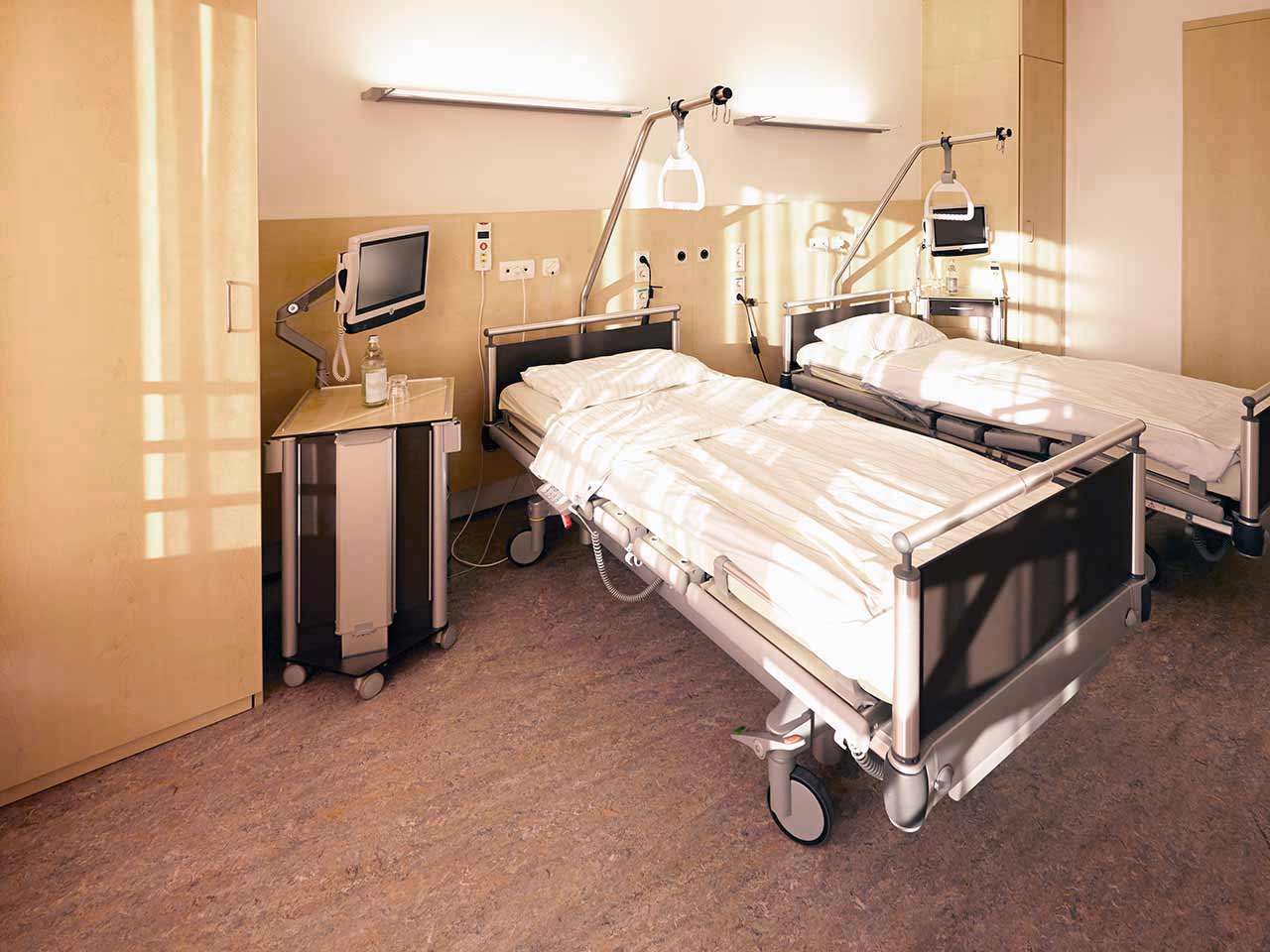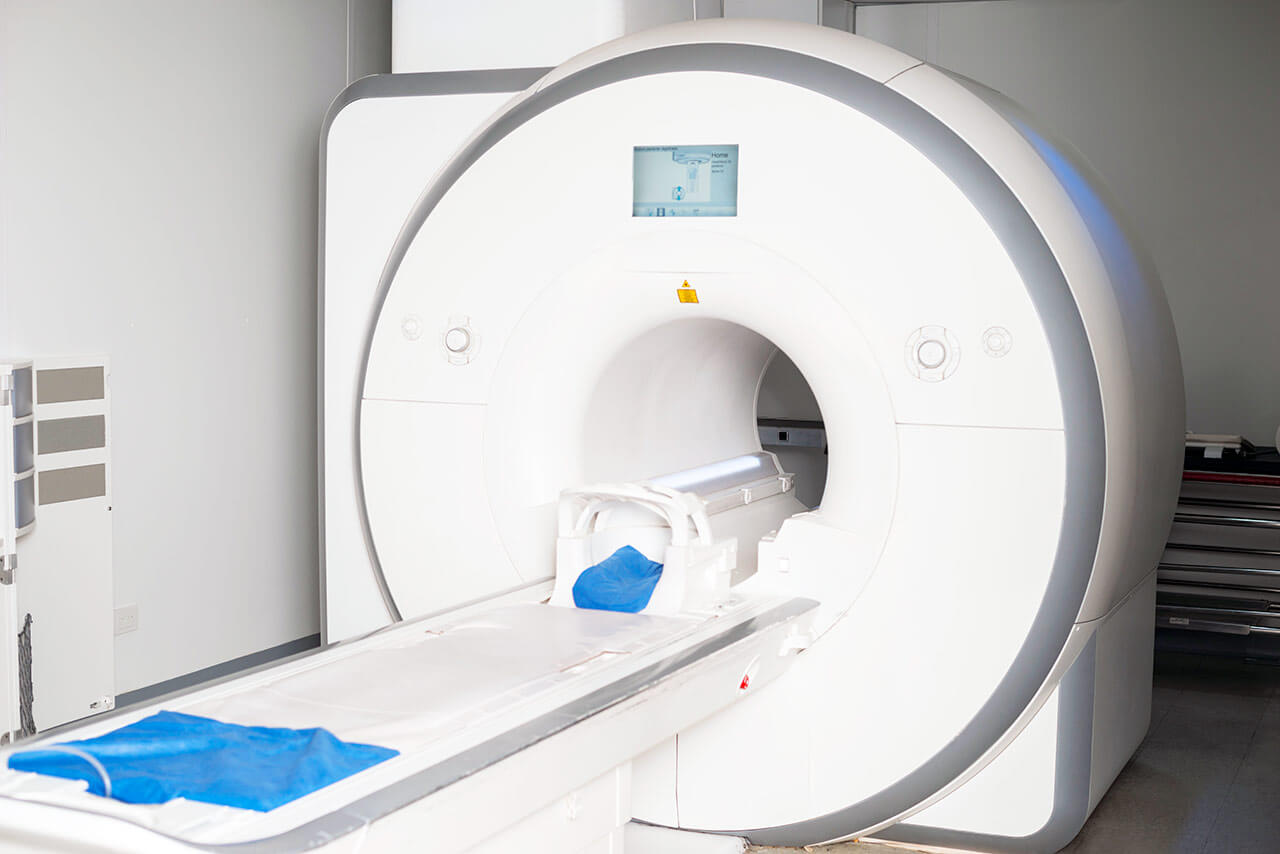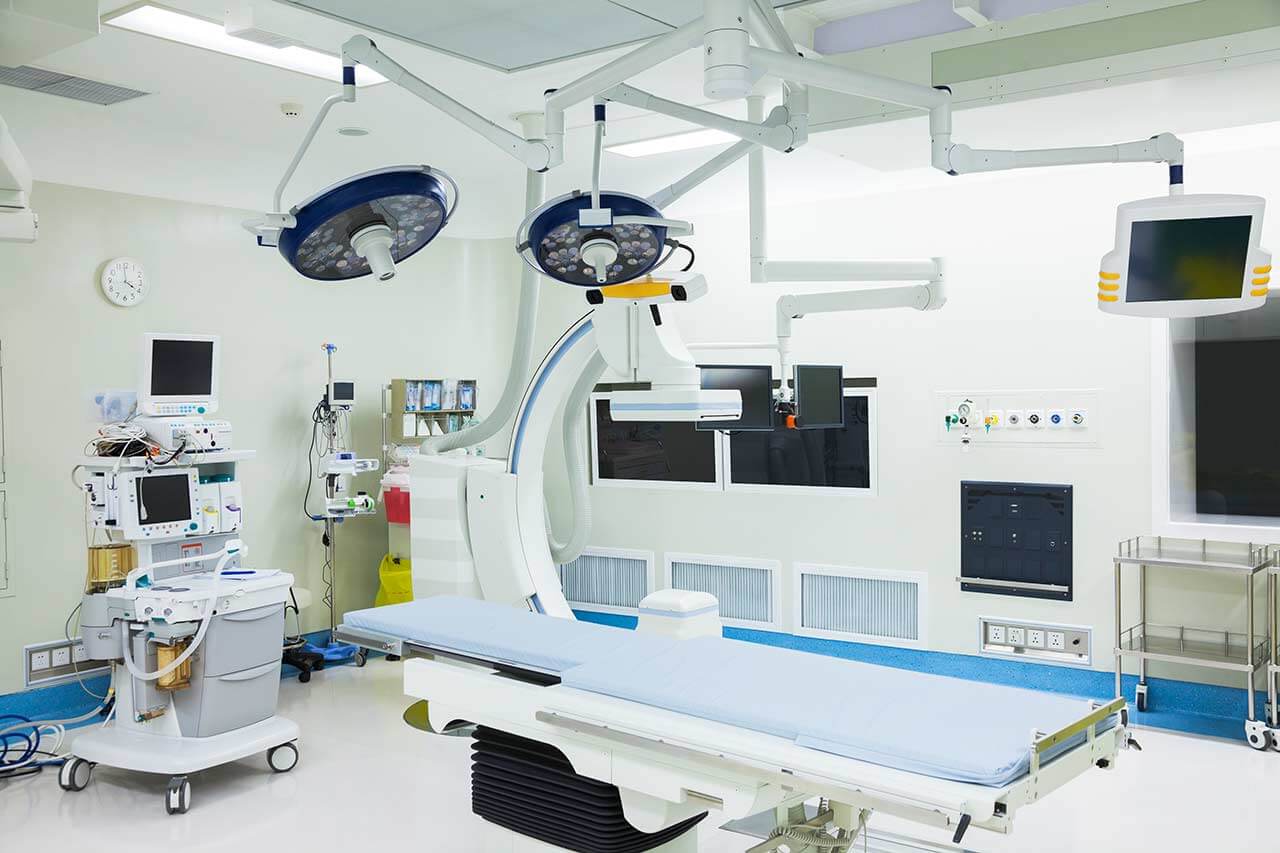
The program includes:
- Initial presentation in the clinic
- case history collection
- general clinical examination
- laboratory tests:
- complete blood count
- general urine analysis
- biochemical analysis of blood
- indicators of inflammation
- indicators blood coagulation
- X-Ray/MRI scanners
- preoperative care
- minimally invasive surgery of achilles tendon
- symptomatic treatment
- control examinations
- physiotherapeutic procedures
- orthopedic appliances
- the cost of essential medicines and materials
- nursing services
- full hospital accommodation
- explanation of future recommendations
Required documents
- Medical records
- MRI scan (if available)
Service
You may also book:
 BookingHealth Price from:
BookingHealth Price from:
About the department
The Department of Adult and Pediatric Orthopedics, Trauma Surgery and Foot Surgery at the Nuremberg Hospital offers diagnostics and effective treatment of the full range of musculoskeletal diseases, including traumatic injuries. The department's team of doctors also specializes in the treatment of foot pathologies and deformities. The department houses the maximum care Joint Replacement Center certified by the German Society for Orthopedics and Orthopedic Surgery (DGOOC). The key focus of the center's work is knee and hip replacement surgery. When performing joint replacement surgery, the specialists use modern, low-traumatic techniques and high-quality regional anesthesia for pain management and rapid recovery in the postoperative period. The department's doctors also have vast experience in arthroscopic knee surgery. Musculoskeletal injuries are treated at the center certified by the German Trauma Society (DGU). The team of pediatric orthopedists successfully deals with the conservative and surgical treatment of pathologies of bones, joints, and muscles in young patients. The department's technical equipment meets the strict standards of advanced medicine, which, combined with the professionalism of the physicians and comfortable infrastructure, forms a solid basis for providing high-quality medical care. The department is headed by Prof. Dr. med. Hermann Josef Bail.
The department offers the services of a highly specialized Joint Replacement Center, whose specialists regularly perform successful knee and hip arthroplasty. The surgeons also perform revision joint replacement surgery. Almost all arthroplasty procedures are performed using modern minimally traumatic techniques, thanks to which the integrity of the muscular-ligamentous apparatus can be preserved. Recovery after such operations takes a matter of days, and many patients are on their feet on the day of arthroplasty. The operating rooms at the center are equipped with state-of-the-art computer navigation systems, with the help of which surgeons achieve optimal positioning of the prosthesis, which guarantees its long-term service life. Custom-made knee and hip joint prostheses are also available if required. Another benefit for patients is the use of the very latest regional anesthesia techniques, which ensure adequate pain management while significantly reducing the load on the body as compared to general anesthesia.
An important focus of the department's orthopedists is knee arthroscopy. The specialists most often perform arthroscopic meniscal sutures, meniscal transplants, anterior cruciate ligament reconstruction, cartilage transplants, and cartilage microfracture surgery. The department also performs autologous chondrocyte implantation, which is nowadays an innovative procedure for knee arthrosis treatment. The technique involves a two-stage procedure: harvesting the patient's own cartilage cells (chondrocytes), followed by their processing in laboratory conditions, and then injecting the obtained biological material into the affected knee joint using arthroscopic techniques. Autologous chondrocyte implantation has proven to be effective, often helping patients in the early stages of knee arthrosis avoid joint replacement surgery. This treatment method is offered only at a few progressive medical facilities in Europe because it requires special laboratory equipment and the professional training of doctors.
The department's team of trauma surgeons admits patients within a specialized center certified in accordance with the requirements of the German Trauma Society (DGU). The center provides modern treatment of bone fractures and soft tissue injuries of the musculoskeletal system (muscles, tendons, and ligaments). The specialists at the center have vast experience in the treatment of severe and multiple injuries. The clinic has a helipad, thanks to which a patient can be delivered here as quickly as possible for urgent medical care.
The department also admits young patients with orthopedic diseases and musculoskeletal injuries. Pediatric orthopedists have in their arsenal many effective conservative and surgical treatments for hip dysplasia, slipped capital femoral epiphysis, patellar dislocation, flat feet, spinal deformities, spinal fractures, etc. The specialists give preference to conservative therapy, while surgery is considered the last-line treatment and is resorted to when other therapeutic options have been exhausted. When elaborating a treatment regimen, the age of the child is always taken into account because it is important for doctors to provide young patients not only with effective treatment but also ensure the normal development of their growing bodies.
The department's main clinical activities include:
- Adult orthopedics
- Joint replacement surgery
- Partial and total knee and hip joint replacement surgery, including the implantation of custom-made prostheses
- Revision surgery for the replacement of previously implanted knee and hip joint prostheses
- Treatment of complications after joint replacement surgery (for example, infections, prosthesis damage or instability, or pain)
- Corrective osteotomy
- Arthroscopic knee surgery
- Arthroscopic meniscal sutures
- Meniscal transplants
- Anterior cruciate ligament reconstruction surgery
- Cartilage transplants
- Cartilage microfracture surgery
- Autologous chondrocyte implantation
- Conservative and surgical treatment of chronic non-healing wounds on the lower limbs
- Joint replacement surgery
- Pediatric orthopedics
- Conservative and surgical treatment of hip dysplasia
- Conservative and surgical treatment of slipped capital femoral epiphysis
- Conservative and surgical treatment of patellar dislocations
- Conservative and surgical treatment of flat feet
- Conservative and surgical treatment of spinal deformities
- Conservative and surgical treatment of spinal fractures
- Trauma surgery
- Conservative and surgical treatment of bone fractures and soft tissue injuries of the musculoskeletal system, including especially complex and multiple injuries
- Foot surgery
- Conservative and surgical treatment of all foot and ankle injuries, including their complications
- Surgical repair of hallux valgus and other toe deformities, including hammer toes, claw toes, etc.
- Conservative and surgical treatment of degenerative changes in the ankle joint
- Conservative and surgical treatment of pathological tendon lesions
- Conservative and surgical treatment of inflammatory foot lesions and chronic wounds
- Conservative and surgical treatment of diabetic foot syndrome
- Conservative and surgical treatment of Charcot foot
- Other medical services
Curriculum vitae
Board Certification
- Board certification in Surgery (focus on Trauma Surgery).
- Board certification in Trauma Surgery and Orthopedics.
Memberships in Professional Societies
- Member of the Presidium of the German Society for Orthopaedics and Trauma Surgery (DGOU).
- Member of the Interim Advisory Board in the Presidium of the German Society of Trauma Surgery (DGU).
- Orthopaedic Research Society (ORS).
- German Society of Osteology (DGO).
- Professional Association of German Surgeons (BDC).
- Association for the Study and Application of the Methods of Ilizarov (ASAMI).
- Professional Association of Orthopedics and Trauma Surgeons (BVOU).
- Berlin-Brandenburg Surgical Society.
- German Society for Disaster Medicine (DGKM).
- Representative of the Working Group on Disaster Medicine at the German Society of Trauma Surgery (DGU).
- Member of the Emergency and Intensive Care and Serious Trauma Treatment Section of the German Society of Trauma Surgery (DGU).
- AE ComGen ("Next Generation", Working Group on Joint Replacement Surgery).
- Advisory Board Member of the Georg Thieme Verlag KG.
Photo of the doctor: (c) Klinikum Nürnberg
About hospital
According to the reputable Focus magazine, the Nuremberg Hospital ranks among the top German medical facilities!
The hospital is one of the largest, highly specialized medical centers in Europe and positions itself as the maximum care hospital. The healthcare facility is an academic hospital of the Paracelsus Medical University in Nuremberg. It houses 42 departments, institutes, and highly specialized centers focusing on various medical fields. All the hospital's employees work hand in hand for the benefit of their patients. The specialists strive to provide top-class medical care for every patient. Moreover, the medical team always shows a humane attitude and understanding towards the patient's life situation, making every effort to support them during the entire therapeutic process.
The total number of beds in the hospital is 2,233. The medical team consists of more than 8,400 employees, including many world-famous doctors and professors who had their clinical training at the best medical facilities in Germany, other European countries, and the USA. The hospital admits more than 100,000 inpatients and more than 170,000 outpatients annually. The number of patients who come to the hospital steadily increases every year, which is the best confirmation of its high standards and outstanding treatment results.
The cornerstone of successful clinical practice is state-of-the-art technical infrastructure. The hospital offers its patients innovative technologies such as the Da Vinci surgical system, devices for stereotactic procedures, intraoperative radiation therapy, angiography, PET CT devices, high-intensity focused ultrasound, 64-slice CT scanners, and other advanced medical devices. The combination of cutting-edge technical facilities and the high competence of the physicians allows for the provision of effective treatment even in the most complex cases.
The Nuremberg Hospital is undoubtedly one of Germany's leading medical facilities, where patients benefit from modern infrastructure, precise diagnostics, effective treatment, and responsive care.
Photo: (с) depositphotos
Accommodation in hospital
Patients rooms
The patients at the Nuremberg Hospital live in comfortable single and double rooms. Each patient room is equipped with an ensuite bathroom with a shower and a toilet. Standard rooms include an automatically adjustable bed, a bedside table, a wardrobe for storing clothes, a table and chairs for receiving visitors, a TV, and a radio. The hospital also offers Wi-Fi.
If desired, patients can live in enhanced-comfort rooms. Such patient rooms are more spacious, and their furnishings correspond to the level of an upscale hotel.
Meals and Menus
The patients at the hospital are offered tasty and balanced meals three times a day: breakfast, lunch, and dinner. The patients have a daily choice of three dishes for lunch and dinner, while breakfast is served as a buffet.
If, for some reason, you do not eat all foods, you will be offered an individual menu. Please inform the medical staff about your food preferences prior to treatment.
Further details
Standard rooms include:
Accompanying person
Your accompanying person may stay with you in your patient room or at the hotel of your choice during the inpatient program.
Hotel
You may stay at the hotel of your choice during the outpatient program. Our managers will support you for selecting the best option.





